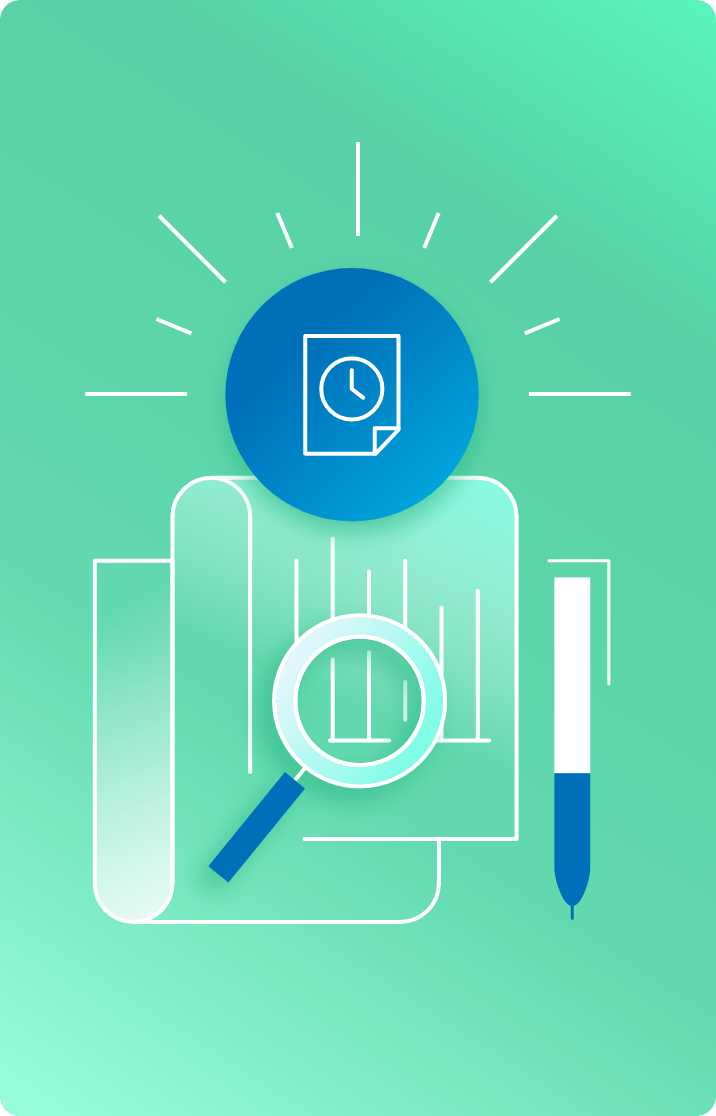Medical Record Retrieval Pricing
Enjoy fair medical record retrieval pricing that saves you money by paying a single flat fee for each record request.
Our National Average Turnaround Time for Record Retrieval Is:
The RRS fair pricing model
At RRS, we are committed to fair medical record retrieval pricing where you don’t get charged for services you don’t receive. This means absolutely no marked-up fees for providing copies of electronic records — whether it’s 3 or 3,000 pages of electronic records produced, we pass the savings on to you.
With our fair pricing model, you pay a $45 fixed flat fee covering all aspects of a typical records request, including:
- Preparing and sending a records request to the facility
- Reviewing HIPAA authorization for accuracy and completeness
- Timely follow-ups on the status until the request is completed
- Sharing progress notes of status check attempts through an online portal
- Automatic issuance of “No Records Found” certificates
- Arranging licensed agents to pick up and copy or digitize records (in California only)
- Ensuring accuracy of patient and provider information and date ranges on records receive
-
Making your records available for download through our secure, encrypted online repository (Read more about our security)
-
We understand most medical record retrieval providers automatically charge you twice for medical and billing records. At RRS, we believe in fair pricing. If we're able to request the record types needed together, you will only pay our flat fee of $45 per request. If the provider makes us send 2 requests to get the records, maybe because they have 2 different departments or they have their billing with an outside vendor, then you will have to pay two requests at $45 each. Whenever we can save money, we pass on the savings to you too...
Provider's medical records fee
To maintain our seamless, fast records delivery service, we initially pay medical provider’s fees and copy service fees when required. These costs are then added to your invoice. We keep requests moving quickly by automatically sending payment as soon as your request is made.
It should be noted that:
- You can establish a threshold amount that will trigger us to ask you for approval before we pay a provider’s fee.
- If a provider’s fee is higher than the legal limit, we will send the provider a copy of their state’s established fee limits and request compliance. If they refuse and the amount exceeds your set threshold, we will ask for your approval before paying the fee.
Save even more time with our supplemental services
For additional cost savings and stress relief, opt for these services available at an additional cost:
- Organization of records by provider, date, or however you wish, and creation of a customized index
- A medical treatment timeline that includes hyperlinks to original source documents, reducing time spent reviewing documents
- Professional medical records summaries, enabling faster and more accurate case evaluation
- Bates stamp records
- Optical character recognition (OCR) that makes records searchable
- The ability to repost archived records to the client portal
- Delivery of documents to opposing counsel or other third parties
- Office of Disability Adjudication and Review (ODAR) exhibit file copying

Billing and payment options
For enhanced efficiency and convenience, our clients can benefit from our various payment options, including credit card, ACH (electronic payment), and automatic payment where we pay invoices on our clients’ behalf.
With our convenient payment options, you benefit by:
- No longer having to write checks every week
- Eliminating the hassle of paying dozens of healthcare providers — you simply pay us
- Saving time — bookkeeping is easier and staff are able to work more efficiently
Accurate and fair pricing
We outsourced to RRS based on feedback from colleagues about their speed, accuracy, and fair pricing — they have lived up to the hype! They are by far the most efficient and economical medical record retrieval service we have used in nearly 30 years of legal practice. They free up time for us to handle the more important and significant aspects of our cases.
John C. Miller, Jr.
Miller Injury Attorneys
Our record retrieval solutions
Medical Record Retrieval
Medical Record Summarization
Simple medical record retrieval with RRS
Our process is as easy as 1-2 !
- Average delivery time is 16 days.
- If allowed, our licensed agents will pick up, copy, and digitize paper records (California only).
- “No Records Found” certificates are issued automatically.
Submit your medical record request through our online portal, then go on to more important work.
Your records will be available for download through our secure, encrypted online portal.
- Average delivery time is 16 days.
- If allowed, our licensed agents will pick up, copy, and digitize paper records (California only).
- “No Records Found” certificates are issued automatically.

Let's get the conversation started
Are you dealing with a large amount of monthly record retrieval requests or have specific requests you would like to discuss with us?
Contact us now or call 866-211-7866 to speak to one of our experts.




